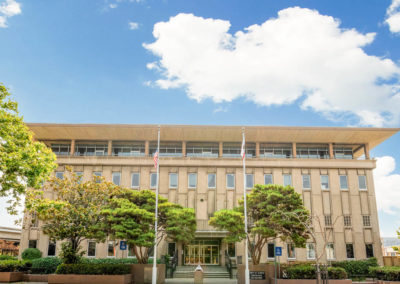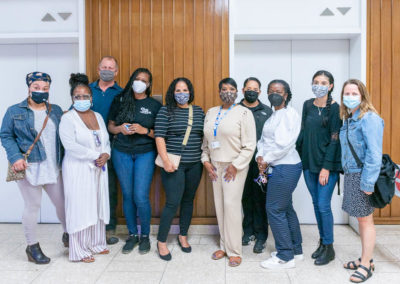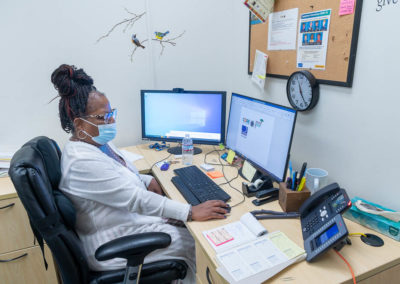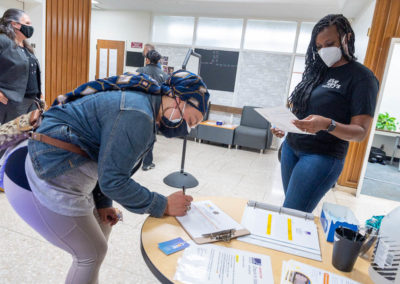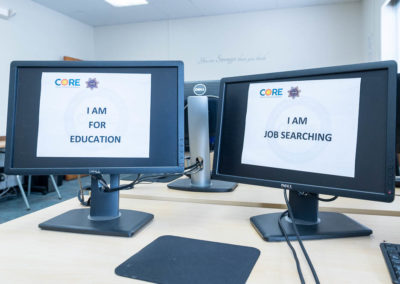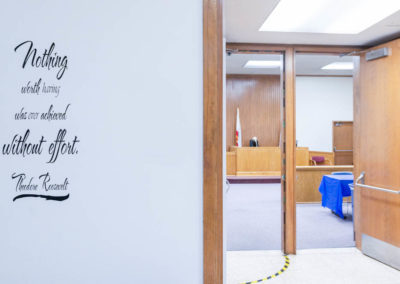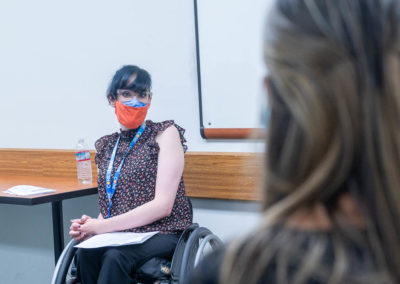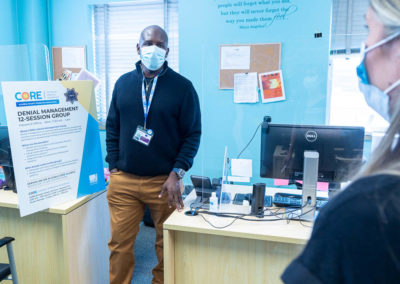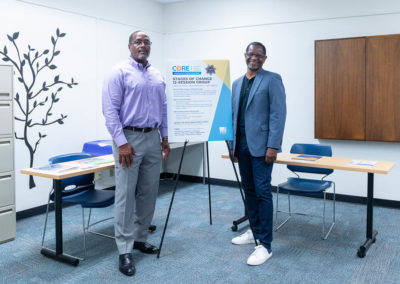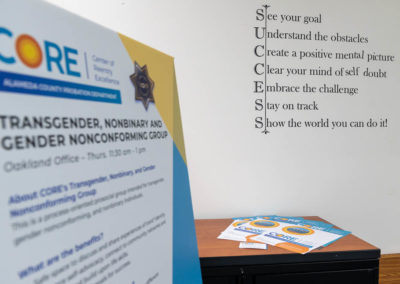Friendly faces and a festive atmosphere greeted visitors to Felton’s Center of Reentry Excellence (CORE), at a late August open house celebration at our downtown Oakland offices.
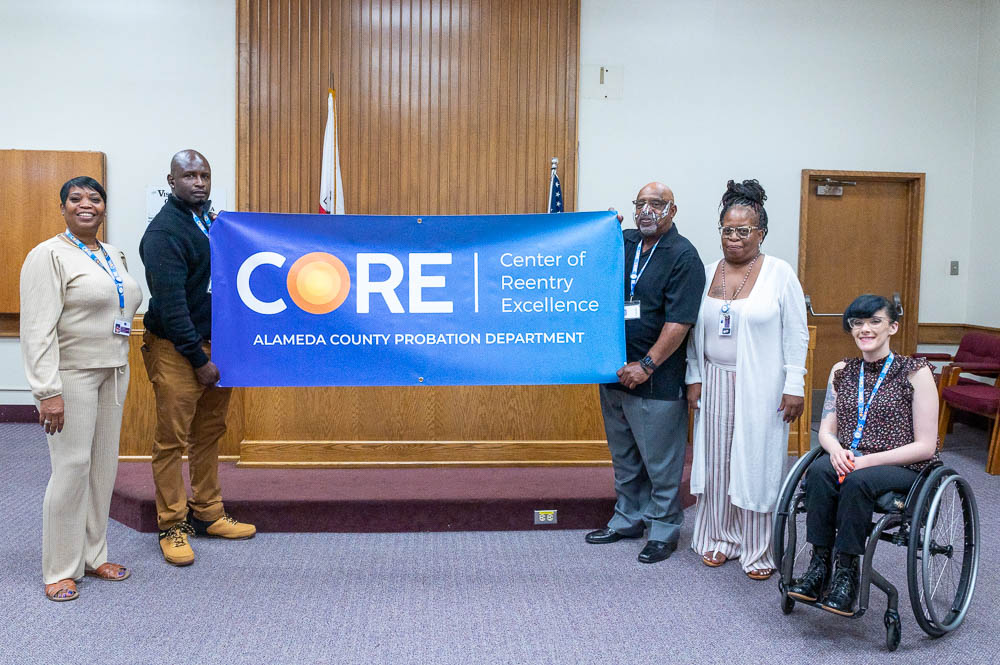
At this site, Felton Institute, in partnership with the Alameda County Probation Department, offers new programs to help residents returning to the community from jail or state prison. The CORE program welcomes all direct referrals from the probation department to this one-stop hub providing a range of reentry services, including four new support groups starting up this fall.
The Open House attracted probation officers as well as a dozen clients who were able to enjoy a hot barbeque lunch and sign up for a case manager meeting. CORE has three reentry case managers, one clinical case manager, and one peer support specialist with plans to onboard more case management and support staff.
Kelly Mitchell, the Alameda County Deputy Chief of Adult Field Services, said, “We hope these services will enable clients to transition much faster, and hopefully not recidivate. If they fail, we fail. We are really excited about the CORE services.”
Wrap-around Services
“We know when clients come in, they are often in crisis,” said Mona Blake, a Lead Case Manager, as she gave a tour of the 2nd floor at 400 Broadway where the different services are offered. “We have clients in need, so we don’t want them to leave without having resources. We connect them with services and ongoing case management.”
Along with counseling for everyday trauma, Mona Blake says the wrap-around services include helping clients reclaim their California ID, Social Security Card, get ready for housing and employment, connect with transportation such as with a Clipper Card, and obtain groceries.
Clients may also shop for free clothes and accessories at Maya’s Corner, an on-site clothing boutique of donated men’s and women’s clothes, that they can take home in a CORE-branded bag. The boutique especially needs men’s pants and belts with 34 to 38-inch waists and wallets.
Blake, an Oakland native says, “I like working with people. I enjoy helping and seeing people go through transitions.” She is also appreciative of how the job allows her to be authentic in reaching people.
Clients are welcome to drop by the computer lab 9 a.m. to 5 p.m., Monday through Friday, where screens display supportive signs: “I am for resumes,” “I am searching for lost relatives,” and “I am checking on emails.” Uplifting quotes decorate the hallways on the way to the kitchen where clients can pick up a snack or microwaveable meal.
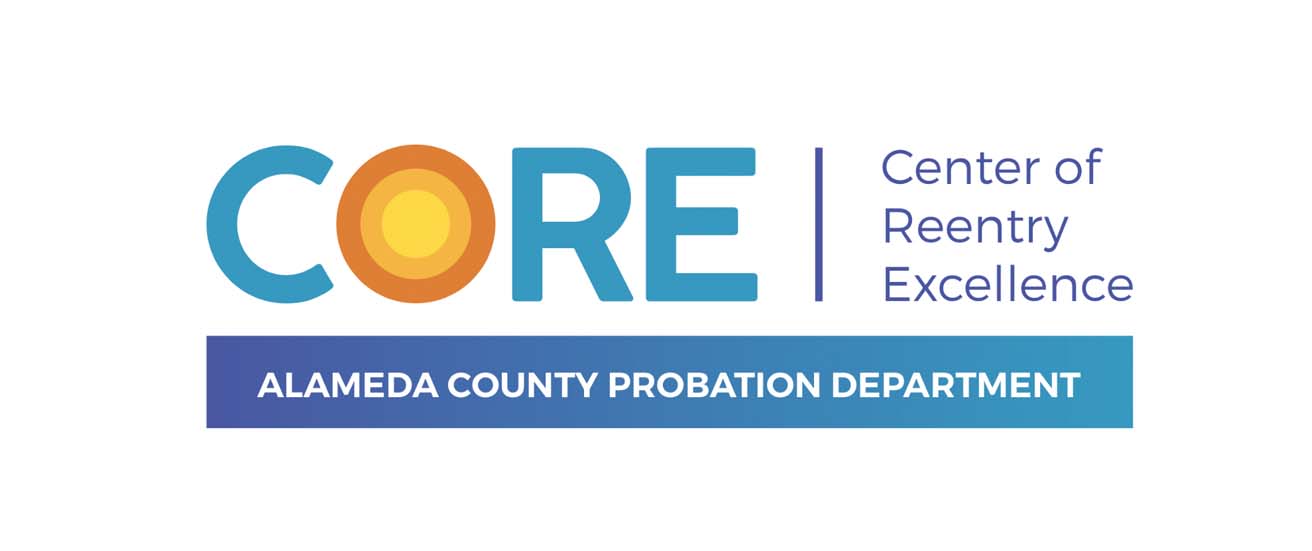
Support Groups
Among the four new group workshops are Stages of Change, Denial Management, and Anger Management. Case Manager Celia Shure will be facilitating the Transgender, Nonbinary, Gender Nonconforming Group, which will be client-centered according to participants’ needs and interests. She is gauging interest in preparation for the series beginning in September for one to ten clients.
“I bring ideas for discussion, and we cater resources offered to what makes sense for the population who show up,” she said.
Workshops can include practical help such as assistance filling out paperwork to change one’s gender on a driver’s license or filling out EBT (Electronic Benefits Transfer) forms, that give clients automated access to CalFresh and CalWorks state programs.
Shure is also ready with resources for conflict management, developing and maintaining healthy relationships, self-advocacy, and setting goals and boundaries.
“It is a built-in community; we will be sharing intimate parts of ourselves,” she adds. “l like to do goal setting every week.”
Clinical Case Manager Keith Bussey will be leading the other three workshops. Groups will meet in person for three days a week, for as many meetings as clients can make. Bussey says that the 12-week format will help clients see the long-term benefits and reinforce positive behavior.
“We are reaching out so people can start the process together, experience the rewards, and support prosocial behavior.” He emphasizes, “Socialization is not only considering what is good for you but what is good for others.”
Bussey has a background as a marriage, family, and child therapist as well as in alcohol and drug abuse counseling, using cognitive behavior therapy to support clients in finding what works. He says that by helping clients become aware of warning signs, they can learn to do better.
“Anger is a natural emotion, but we can learn dysfunctional ways of reaction. Anything we learn, we can unlearn.” Bussey says he works toward changing the attitude, “If you do something that makes me angry, I get to do something angry to you. This often starts in the family of origin and extends into the family of creation.” The workshop counselors begin by teaching mindfulness and recognizing emotional triggers.
Welcoming All
Often a Case Manager will be near the elevator ready to greet whoever steps off, or administrator Tierie Jefferson will be available in her nearby office.
“We try to help people feel comfortable, offer them something to eat, a hygiene bag, a visit to the boutique – help them get situated first. We let them know they are in a safe environment before they are assigned to a case manager.” She explains how it is not uncommon for clients to feel afraid, not want to be there, and to be agitated.
CORE Director Michael Huff said, “We have people here who are open and willing to support emotionally. It’s the saying, People don’t care about how much you know until they know how much you care.”
Clients needing additional mental health services are triaged to Felton’s Hayward offices and other community mental health programs. CORE offers one-off services for walk-in clients who are not direct Alameda County Probation referrals.
Since Felton’s CORE program began in March 2020, we have served more than 500 clients.
Funding Statement: This work is supported by the Alameda County Probation Department, funded by AB109 dollars, as part of the Reentry Engagement Center Master Contract No. 901780.
Written By: Rachel Cohen
About Felton Institute: Founded in 1889, Felton Institute responds to human needs by providing cutting edge, evidence-based mental health and social services that transform lives. Felton Institute is a tax-exempt organization registered 501(c)(3) nonprofit under EIN 94-1156530.
Offering more than 50 acclaimed and honored programs that address homelessness, mental health, prenatal, adolescent, adult, and senior needs, Felton Institute provides services in San Francisco, Alameda, San Mateo, Marin, and Monterey counties. Felton’s social services and programs utilize the latest scientific research, combining cultural sensitivity, deep respect for client and staff, and a commitment to social justice.
Felton is the oldest non-sectarian and nonprofit social services provider in the City and County of San Francisco. For over a century, Felton Institute has been at the forefront of social service innovation, pioneering new approaches to meet underserved populations’ emerging needs. At the heart of our work is the belief that individuals and families in crisis must have access to services and resources to help them build on their inherent strengths and develop self-sufficiency. www.felton.org
